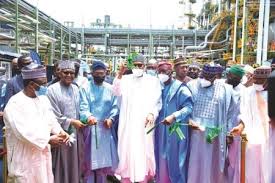Notice: Undefined index: banner_ad_width in /home/ayekooto/public_html/wp-content/plugins/quick-adsense-reloaded/includes/render-ad-functions.php on line 359
Notice: Undefined index: image_width in /home/ayekooto/public_html/wp-content/plugins/quick-adsense-reloaded/includes/render-ad-functions.php on line 359
Notice: Undefined index: banner_ad_height in /home/ayekooto/public_html/wp-content/plugins/quick-adsense-reloaded/includes/render-ad-functions.php on line 360
Notice: Undefined index: image_height in /home/ayekooto/public_html/wp-content/plugins/quick-adsense-reloaded/includes/render-ad-functions.php on line 360
President Muhammadu Buhari is expected to commission Alh. Aliko Dangote’s $2.5 billion urea fertilizer plant.
The fertiliser complex, which cost $2.5 billion to build, is situated on a 500-hectare plot of land in the Lekki Free Trade Zone in Ibeju Lekki, Lagos, and is Africa’s largest granulated fertiliser complex.
The factory, one of Africa’s wealthiest man Aliko Dangote’s most recent projects, is being built in the same area as his 650,000 barrels per day oil refinery.
President Muhammadu Buhari is expected to commission the facility on Tuesday.
According to the World Bank, Nigeria, Africa’s most populated country, has one of the lowest fertiliser applications on the continent, at 20 kilogramme per hectare, trailing behind peers such as Egypt and South Africa.
The recommended fertilizer use per hectare in the country is 100 kilogrammes.
Nigeria’s fertiliser demand is expected to rise to between 5 and 7 million metric tonnes in the coming years, and the company hopes to close an 80 percent supply gap now filled by imports.
On completion, analysts expect the Dangote Fertiliser Plant to generate roughly $400 million in foreign exchange revenues for the country through exported products.
The coming on stream of Dangote Fertiliser would surely make Africa self-sufficient in food production and a net exporter of food to the world,” the company said.
Fertiliser from the plant could help curb the acutely low yields in Nigeria, a situation partly resulting from limited access to the product.
Fatimah Oyesanmi



Comment here